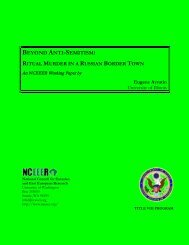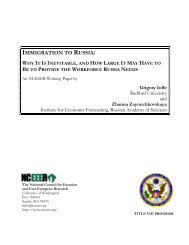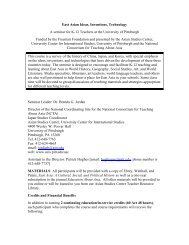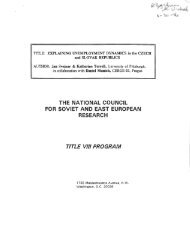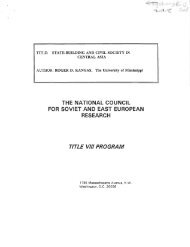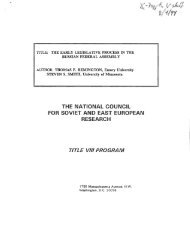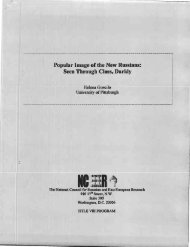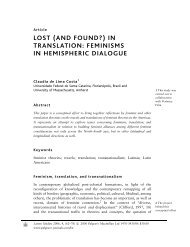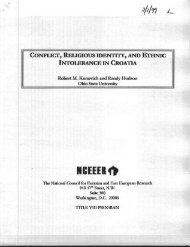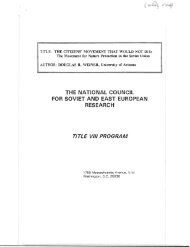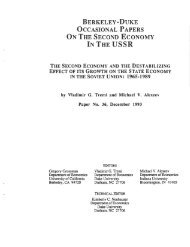The Russian Underground Economy in Transition - University ...
The Russian Underground Economy in Transition - University ...
The Russian Underground Economy in Transition - University ...
Create successful ePaper yourself
Turn your PDF publications into a flip-book with our unique Google optimized e-Paper software.
and crypto-private economic activities seemed to spur the development of the underground .<br />
Accord<strong>in</strong>g to an estimate of a Soviet researcher, the legalization of about 800 million rubles '<br />
worth of the shadow economy <strong>in</strong> 1988 was accompanied by an <strong>in</strong>crease of 1,400 millio n<br />
rubles' worth of various illegal activities . 2 0<br />
What led to such an outcome? As was mentioned above, some of the actions of th e<br />
Gorbachev's government contradicted the general direction of reforms . For example, the anti -<br />
alcohol campaign launched by the Soviet government <strong>in</strong> May of 1985 sharply raised prices o f<br />
alcohol and restricted production of alcoholic beverages by the state . Naturally, this resulted <strong>in</strong><br />
a dramatic rise of bootlegg<strong>in</strong>g and home-brew<strong>in</strong>g . Illegal sales of alcohol reportedly <strong>in</strong>crease d<br />
by 42% <strong>in</strong> the first 10 months of 1986. Some Soviet specialists ma<strong>in</strong>ta<strong>in</strong>ed that the reduction s<br />
<strong>in</strong> state-controlled output of alcoholic beverages was fully offset by <strong>in</strong>creased production of<br />
moonsh<strong>in</strong>e . 2 1<br />
Ironically, even the more radical measures proved to be counterproductive with respec t<br />
to their effect on the underground economy . In fact, it was the 1988 Law on Cooperatives<br />
which, comb<strong>in</strong>ed with the 1987 Law on State Enterprise, was probably ma<strong>in</strong>ly responsible fo r<br />
the growth of the illegal economic activities dur<strong>in</strong>g the 1988-1991 period . Prior to the Law o n<br />
State Enterprise, the Soviet state-owned firms did most of their f<strong>in</strong>ancial transactions b y<br />
adjust<strong>in</strong>g the balances of their accounts <strong>in</strong> Gosbank (the State Bank) . Payment of wage s<br />
constituted the only significant transaction the enterprises conducted <strong>in</strong> cash . While state-owne d<br />
enterprises operated under the so-called soft budget constra<strong>in</strong>t with respect to non-cas h<br />
transaction, the central planners took special care <strong>in</strong> controll<strong>in</strong>g the wage fund and the cas h<br />
budget of enterprises <strong>in</strong> general.22 <strong>The</strong> separation of the cash and non-cash money flows i n<br />
the economy allowed the central planners to alleviate the <strong>in</strong>flationary pressures <strong>in</strong> the consumer<br />
markets .<br />
<strong>The</strong> 1987 law afforded a large degree of autonomy to state-owned enterprises . In<br />
particular, it gave them greater <strong>in</strong>dependence <strong>in</strong> allocat<strong>in</strong>g their f<strong>in</strong>ancial resources withou t<br />
impos<strong>in</strong>g on them serious responsibility for failure . <strong>The</strong> Law on Cooperatives permitted an d<br />
even pushed cooperatives and state-owned enterprises <strong>in</strong>to a close bus<strong>in</strong>ess relationship an d<br />
association. At the same time, state-owned enterprises were allowed to convert their Gosban k<br />
account balances <strong>in</strong>to cash for purposes of transactions with cooperatives . This <strong>in</strong> essenc e<br />
cracked the " wall" between the two types of money flows . <strong>The</strong> conversion of some non-cas h<br />
20 This estimate offered by T. Koriag<strong>in</strong>a was quoted <strong>in</strong> Grossman (1990) .<br />
21 See Treml (1987) and references there<strong>in</strong> .<br />
22<strong>The</strong> term soft budget constra<strong>in</strong>t co<strong>in</strong>ed by J . Kornai essentially means that the enterprises expected to be<br />
bailed out by the state virtually automatically if they ran out of money <strong>in</strong> the non-cash account .<br />
8




